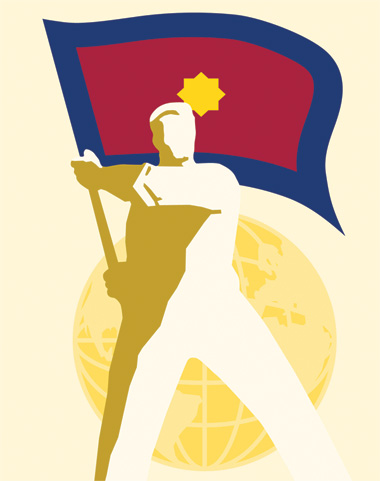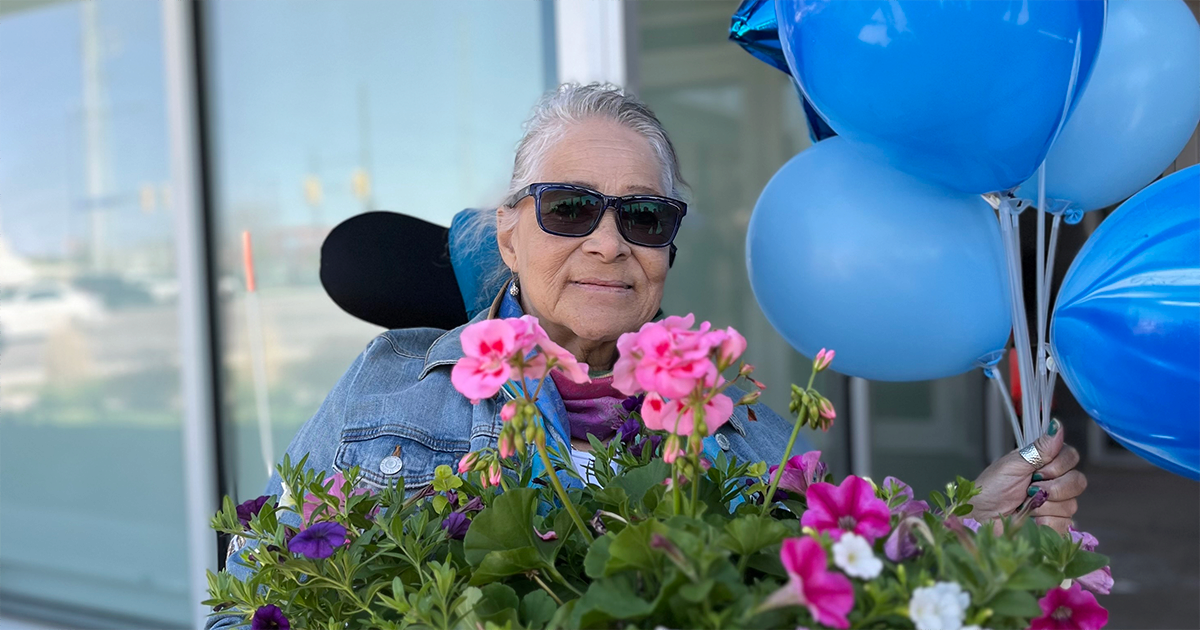YES. Not everyone is ready to sign up for this radical commitment. By calling everyone to the same standard, we don't make room for people who want to belong before they believe.
BY MAJOR RON CARTMELL
 For me, growing up in The Salvation Army meant learning to play an instrument. My earliest childhood memories include sitting in the trombone section beside my father. This is not a testimony to my musical inclinations, but rather a practical child care solution for my mother who had three young children.
For me, growing up in The Salvation Army meant learning to play an instrument. My earliest childhood memories include sitting in the trombone section beside my father. This is not a testimony to my musical inclinations, but rather a practical child care solution for my mother who had three young children.
By the time I was seven, I was ready for the junior band. That seemed only natural to me. My father played in the band, my grandfather played in the band, my uncles played in the band, so I should play in the band. But first I had to sign my name to the junior soldier pledge. I'm sure there were preparation classes, I just don't remember them.
In my teens, I was allowed to play in the senior band on Sundays. That was great! It sure made going to church easier, and I could still be with my friends. The only catch was that I had to become a senior soldier and put on the uniform. I didn't see it as a problem. I wanted to play in the band, and to do that I needed to become a soldier.
Looking back, it's obvious to me that life in the Army followed a certain pattern: when I affirmed that I believed the right things, and I stated that I would behave the right way, then I was given the privilege to officially belong.
There's nothing inherently wrong with wanting to belong. God himself longs for community. In fact, the Trinity—Father, Son and Holy Spirit—demonstrates that community is part of God's very nature. And because we are made in his image (see Genesis 1:26), God has stamped the desire for community deep within our being.
In our modern culture, however, the desire to belong is emerging much earlier than the decision to believe or behave. Allow me to illustrate with an example.
One day I received a phone call from a businessman who said, “Hello, my name is Bill. I belong to your church.” I told him I hadn't met him yet, to which he responded, “That's because I haven't started coming yet!” Not long after, Bill and his family started to attend our church, inspired by one of his family members who attended The Salvation Army in a different community. Bill was unsure of what he believed and his conduct lacked Christlikeness. But he was responding to a God-given desire to belong. And God was working in his life, even if he didn't know it yet.
What does it mean to belong? None of us would restrict Bill from attending worship until he sorts out his beliefs and behaviour. But what if he wants to get involved in ministry? What if he wants to “test drive” this journey with Jesus? How far down the road do we let that go? Would we allow him to play in the band, participate in community care ministry or serve on the corps mission board? What about our rules on soldiership?
For many years The Salvation Army has followed the “believe, behave and belong” system. Today, however, many people are asking, “Will you let me belong while I sort out what I believe and how to behave?”
Most of us grew up with a Christian worldview. It was understood that Christians behaved in a certain way. You would hear people say, “I made the decision to become a Christian so I stopped smoking” or “I had to get married because Christian couples don't live together before marriage.”
Today the Christian worldview is in competition with many other belief systems. This has made people much more skeptical. When people approach Christianity they don't want rational arguments. Instead, they want experiential evidence. “Show me the reality of Christ in your life,” they say.
Soldiership is the Army's metaphor for belonging. But it's more than just membership, it is a sacred covenant. The Soldier's Covenant calls for the highest commitment to discipleship. The problem is, it is increasingly difficult to hold soldiers to their commitments, such as participation in ministry, financial giving and growing in Christlikeness. Perhaps this is because we lack clarity on the meaning and purpose of soldiership. Or perhaps we've simply watered down our expectations. In any case, this ambiguity has effectively silenced much of soldiership's power and witness.
Is the problem more fundamental? Soldiership fits naturally with the old “believe, behave and belong” philosophy. While many are ready to be disciples of Jesus, the language of the Soldier's Covenant becomes a sticking point. It positions The Salvation Army as the covenant holder rather than the vehicle by which this commitment is expressed. Perhaps that's why, relatively speaking, the number of adherents is growing while our soldier rolls are shrinking.
Today's generation is not interested in “signing up.” They don't want lifelong membership. They say, “Show me who you are by your actions, not by your clothing or a piece of paper.”
If soldiership is to continue to have a place in our Movement, it must first of all be a call to radical discipleship and not merely a symbol of membership. It must point to and be intimately connected with the One for whom we are called to lay down our lives. If we can recapture this essence, then soldiership has a future. If not, it's no longer of value.
Major Ron Cartmell is the corps officer at Kelowna Community Church and area commander–Interior Region, B.C. Division.
NO. There is still a war to be waged. We need people who are willing to fight for justice. Soldiership is the essence of the gospel.
BY MAJOR DANIELLE STRICKLAND
In July 1861, the first of the major battles of the American Civil War between the union and the confederacy was fought at Bull Run, a stream near the town of Manassas Junction.
The American people assumed the whole idea of the civil war was just a passing phase and many people came out with their lawn chairs and picnic baskets to watch the first battle. I'm not kidding. What everyone discovered—to their horror—was that there was nothing cute or short or fashionable about this conflict. It would turn out to be the bloodiest war in American history.
The Bible is clear that we are engaged in a war—not a physical war with guns and bullets, but a very real spiritual war. Ephesians 6:10-17 says we fight against principalities, rulers and authorities. Paul even explains how to soldier up with spiritual equipment. Jesus never invited spectators. He wanted disciples. He wanted people who would fight (actively engage the enemy) for God's Kingdom to come. He gave his disciples authority over the enemy and said that he himself had come to destroy the devil's work (see 1 John 3:8). He was the ultimate freedom fighter. The Salvation Army was raised up as a clear response to that call from Jesus. William Booth said, “Salvationism is simply this: the banishment of wickedness from the face of the earth.” What is needed in a war are people who are willing to fight. We call them soldiers.
Is soldiership outdated? An old metaphor? The only way that soldiership is outdated is if the war isn't real. Even asking the question could put us in danger of being arrogant or ignorant enough to believe that there is some cute, easy and metaphorical war being waged and that we can simply find a pew in a lovely community church down the street from our cul-de-sac and watch the entertainment.
Sometimes I think we are in danger of missing the real gospel. In The Call, Os Guiness suggests there is only one call of Jesus, “Come follow me.” There isn't some mystical sacred specialness of an “ordained clergy”—some super spirituality that endows itself upon “certain and chosen” few … there is a clear trumpet call to anyone and everyone who would take the words of Jesus seriously and answer THE call. This is the point of soldiership. It's meant to boil the gospel down to its essence. We aren't spectators. This isn't a cute, metaphorical war—it's the real thing. We are called to help, to enlist, to fight. This is the call of true discipleship and our great heritage of Salvationism.
I know there are many people who find it difficult to believe that we are in a war. And this I find staggering. In these days and times, it almost feels like a willful blindness. Extreme poverty is taking hundreds of thousands of lives every day; children and women are being bought and sold like disposable items at a flea market in a dark and evil sex trade that grows at an unprecedented rate; children are being sold into slavery to make clothes and items in developing countries that we buy on sale and don't ask why they are so cheap. Even in our nice suburban homes, Western society smells of depression, suicide, divorce and bankruptcy; executives of excessive capitalism keep pushing economic gains over ethical purity at the expense of the poor; life is snuffed out at its most fragile and innocent state for the convenience of the strong hundreds of thousands of times every day. Does that sound like a passing phase? A short battle? Dinner theatre?
I remember reading Lt-General Roméo Dallaire's autobiography, Shake Hands With the Devil, in which he recalls his role as Canadian Armed Forces commander amid the horror and evil of the Rwandan genocide. His account is fascinating because although he is a soldier he was not authorized to fight. And so, caught in a bureaucracy of niceties and United Nations lunches and coffee breaks where they discussed whether peacekeeping soldiers were really meant to use force, he watched as almost one million people were murdered in one month. Women, children, men—hundreds of thousands of bodies butchered in churches and in schools. In the end, the hardest thing for him wasn't the massacre—it was that he could have helped. He should have been a soldier, not a spectator.
So should we. Soldiers are not members. The Salvation Army is not a club. Neither are metaphors. This spiritual war is real. I'd suggest we fold up our lawn chairs and leave our discussions over lunch and get ready to join the fight—war is raging. Think of the people we could save, the misery we could stop, the hope we could offer. Think of the light we could be—changing the world for good, bringing peace, “not the absence of conflict but the presence of justice” (Martin Luther King Jr.). Be a soldier, not a spectator.
Major Danielle Strickland is the corps officer at Edmonton Crossroads Community Church.










We need for people to belong and really to feel that they are wanted, worthy and useful.
We want our soldiers to be out and out Salvationist fighting the battle against Satan - a battle that is very real.
While adherency is seen by some as 'second class' and while many soldiers are merely members not 'fighting soldiers' we have weakened both.
I have sat in Corps Councils where DCs have removed soldiers for whatever reason (that bit doesn't matter) and proceeded to make them adherents and in one specific case then took an adherent off the roll for the same thing .
There is a real push for adherents to become soldiers fairly quickly, like soldiership is the real class of membership instead of accepting the adherency part of their journey as being valid for now.
When I make soldiers and they 'don' uniform I want them to be available for service - fully equipped soldiers - I would rather defer soldier ship until I knew they were ready,
Maybe if we strengthen adherency and acknowledge all who feel that they are a Salvo, then this distinction in membership won't be such an issue.
I recently trained a group of Community Care workers the majority of whom were thrift shop volunteers - I have supplied Community Care photo ID tags to all and those thrift shop volunteers who aren't yet members felt so good and valued to be wearing a tag with a Red Shield on it - we thanked them and acknowledged them - the reality is that this corps would not be viable without the work of these good folk and the extraordinary amount of money they bring to the mission of the corps.
Because they feel that they belong they are more likely to come to other things and to find out about Jesus through that connection.
The training includes teaching about what the Army believes, our mission and values, so they got to hear about God's love, about Jesus dying on the cross, about the Spirit guiding presence.
And one day they may become soldiers but not if we don't first welcome them.
In the meantime we accept all the gifts, skills and passion of everyone who fellowships with us and watch as God works a miracle in their life.
I heard a great story at Doncaster corps - there were standards set but participation was welcome and God is changing him from the inside out - let's not debate this ad an either or, but reach out in the way Christ modelled and we can reach out in His name and with His arms if we see every person through the eyes of Jesus after all, He loves them and died for them just as they are now.